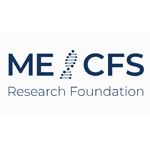We report on ongoing ME/CFS research based on data from the ME/CFS Research Register. This research update will be added to step by step to give patients, relatives and interested parties an insight into the current research landscape.
Last update from 05.06.2024: Part 7 shows the development of scientific publications on ME/CFS in Germany and Austria from 2010 to May 2024
We start with data on ME/CFS research in Germany and Austria. The ME/CFS research projects in both countries are fully recorded in the current "beta version" of the recently introduced ME/CFS Research Register and are continuously updated.
If you would like to read this ME/CFS Research Update as a PDF or print it out (e.g. to pass it on offline), you can download the current version here:
Part 1: ME/CFS research is slowly picking up speed (published 01.03.2024)
The data from the ME/CFS Research Register show the significant increase in research intensity since 2022. The public funding for ME/CFS research (at federal and partly at state level) available for the first time since then has made a number of previously unrealisable projects possible.
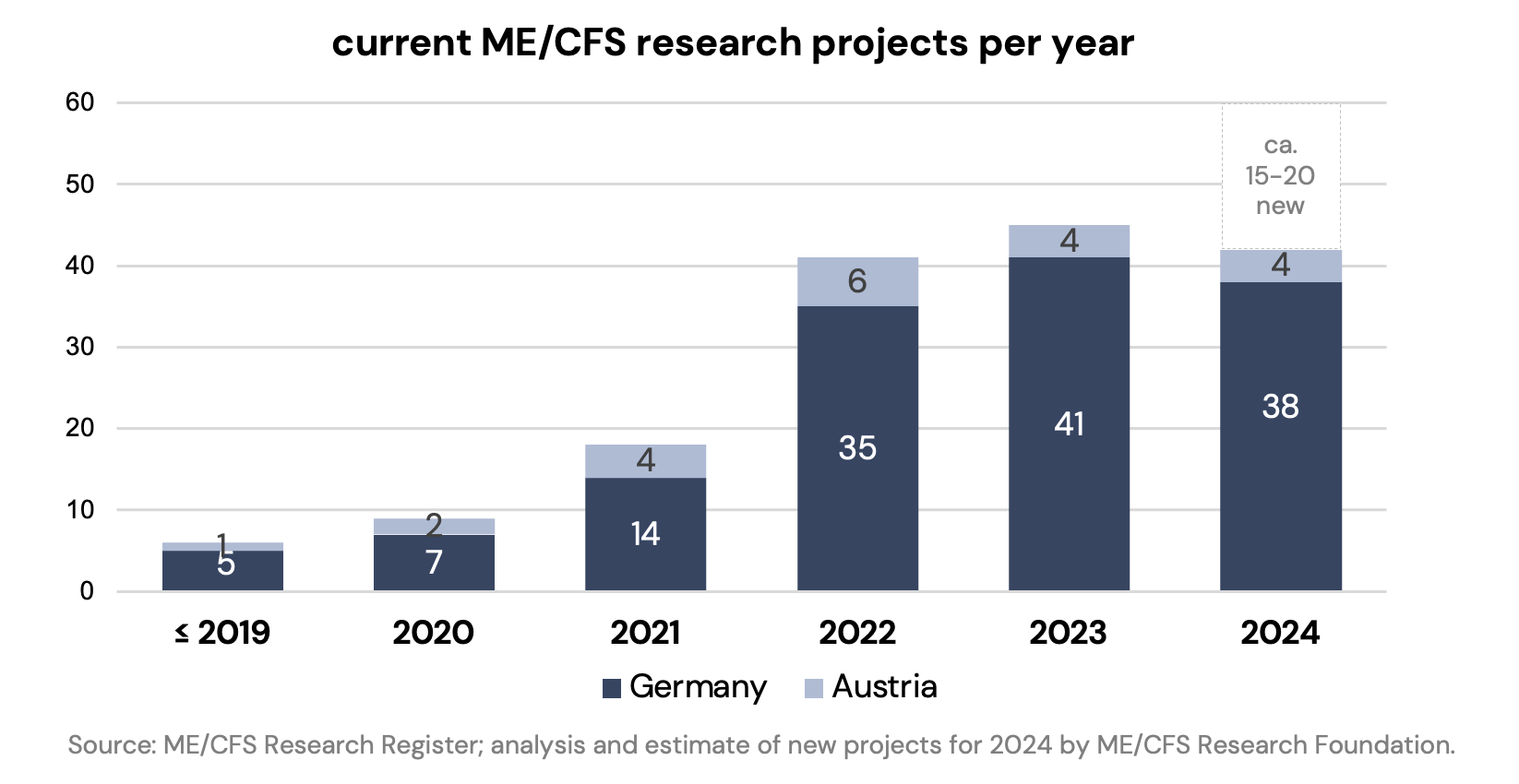
Most of the 42 ongoing research projects were started in 2022 and 2023. These include, for example, the 11 projects of the NKSG - National Clinical Study Group in the field of clinical research and the five projects of the IMMME – Immune Mechanism of ME basic research (funded by the BMBF, Federal Ministry of Education and Research in Germany). Four further projects were made possible by other public organisations. Additional research is funded by private foundations and patient organisations.
Public funding that has already been announced will enable further new research projects and the continuation of ongoing initiatives, e.g. the NKSG, from around mid-2024. This will create a positive, but also long overdue dynamic in ME/CFS research in Germany. ME/CFS is a medical research field that is characterised by a considerable global backlog compared to other diseases. This backlog is due to the amount of available funding and the number of researchers and working groups actively involved in the ME/CFS field to date. Due to the growing importance of post-infectious diseases in the wake of the COVID-19 pandemic, ME/CFS research is also receiving increased attention and has been receiving more public funding since the end of 2021.
The ME/CFS Research Foundation will make this development transparent with the publicly accessible ME/CFS Research Register and will also regularly publish up-to-date data on ME/CFS research. In addition to financial project funding, this is an important contribution to supporting ME/CFS research.
Part 2: How are the ME/CFS projects distributed across different types of research?? (published 28.03.2024)
A total of 61 research projects have been or are still being conducted in Germany and Austria since 2019. These are distributed fairly evenly across the three research types:
- Basic research (24 projects)
- Epidemiological research (19 projects)
- Clinical research (18 projects)
It should be noted that clinical research projects generally require much higher financial budgets than basic or epidemiological research. Looking at the research types in terms of the costs incurred, projects in the field of clinical research account for the majority of financial expenditure.
Of the 18 clinical research projects, nine projects are in the Bereichen Diagnostik und Prognostik Three of these projects have already been completed. A further nine projects are concerned with research into possible therapies for ME/CFS in the form of therapy or phase II studies. These include studies on Methylprednisolone, BC007, hyperbaric oxygen therapy (HBOT), Vericiguat and several studies on Immunoadsorption. All clinical studies on therapy development are currently still being conducted.
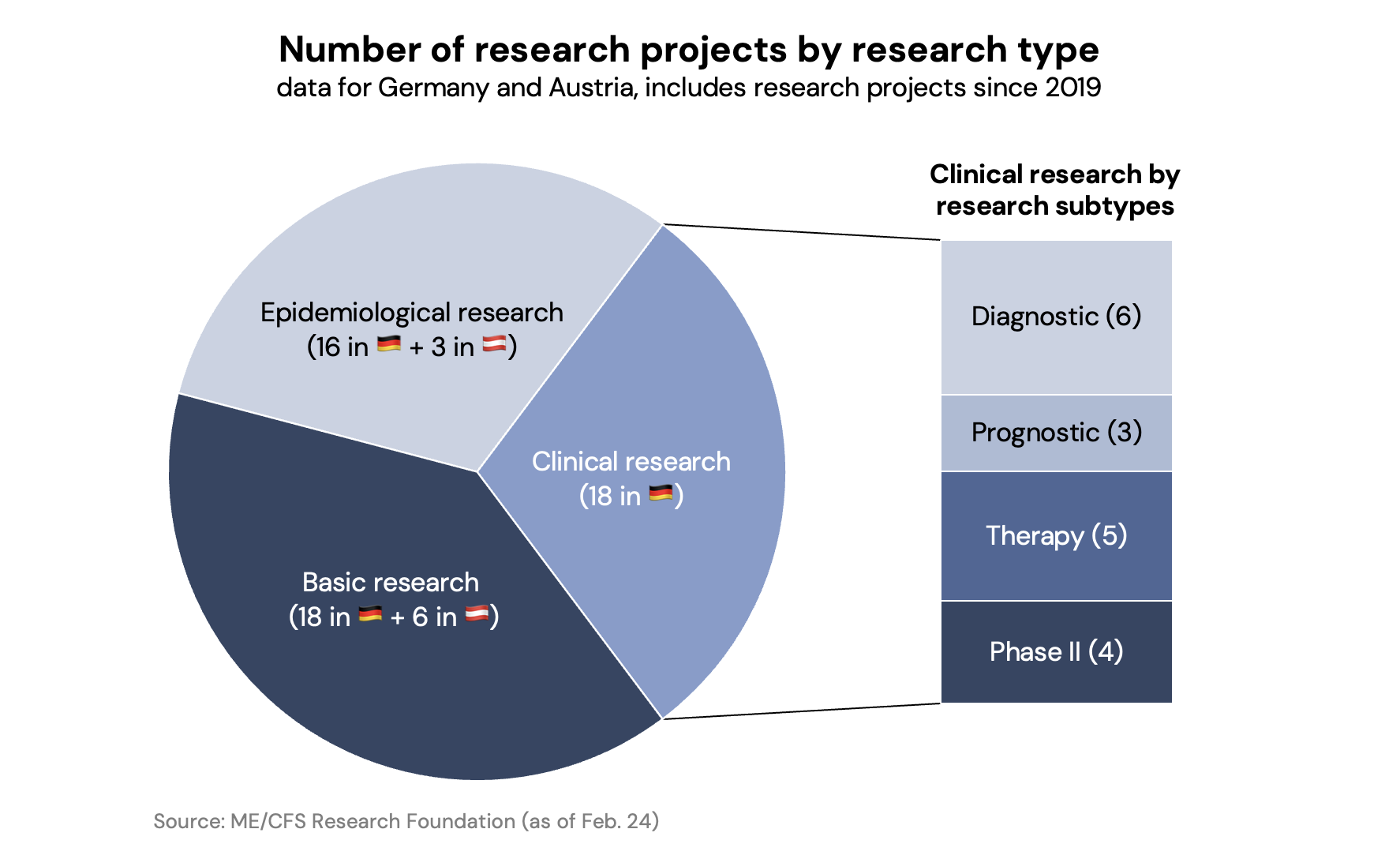
In the ME/CFS Research Register , all 61 projects are described in detail and linked to the involved working groups, researchers and additional information. All projects are assigned to research types , which are also explained in the register. For example, the following subtypes of clinical studies:
- Diagnostics studies aim to evaluate the accuracy of a diagnostic test or method in identifying a disease. In this way, new biomarkers can be analysed for their diagnostic suitability.
- Prognostics studies , on the other hand, examine diagnostic methods in terms of their ability to predict improvement or worsening of a disease over time or following therapy. These studies can be used to determine which biomarkers and diagnostic methods may be able to predict whether a therapy is likely to be successful.
- Observational therapy studies are used to generate initial findings on the effect of treatment interventions. Therapy studies are adapted to the individual needs of the patients and do not follow a strict study protocol.
- Interventional clinical studies, e.g. so-called phase II studies, follow a strict protocol and also include patients who are treated with a placebo. Phase II studies also include a larger number of patients and evaluate the effectiveness of the treatment as well as possible side effects according to a protocol that is uniform for all patients.
Part 3: Which medical research areas are covered by ME/CFS projects? (published 09.04.2024)
In addition to the distribution of projects across research types, i.e. basic, epidemiological and clinical research (see part 2 above), all projects in the ME/CFS Research Register are also differentiated according to medical research areas . Research areas include organs, body systems and health factors studied in connection with the occurrence of ME/CFS. This enables the targeted search for research projects according to thematic focus (e.g. "autoimmunity" or "nervous system disorder" in the ME/CFS Research Register. Please note that most projects are assigned to more than one research area. Hence the total number of research projects in the illustration below exceeds the 61 research projects in Germany and Austria listed in the register so far.
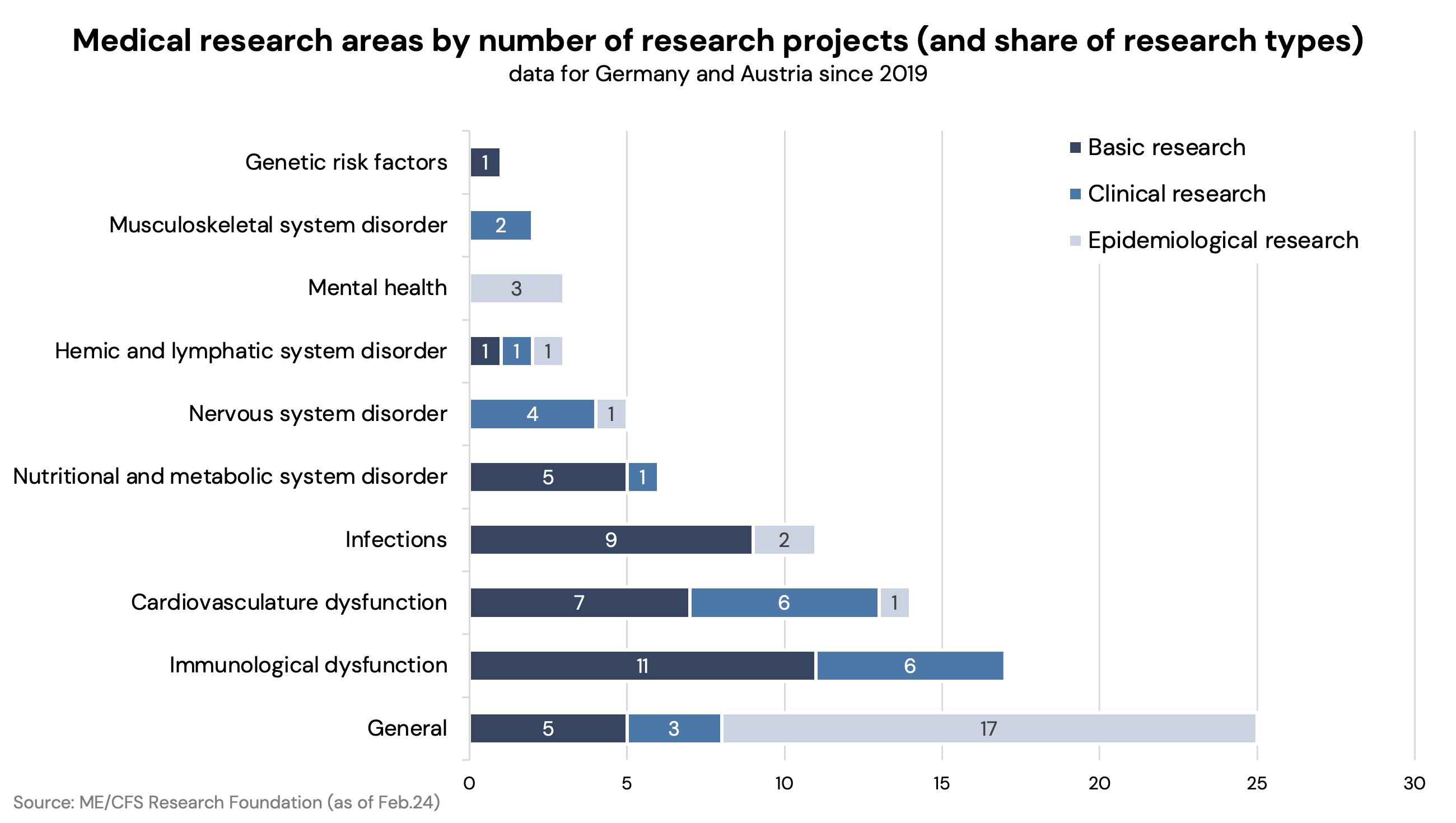
Thegeneralresearch area is the most frequently represented with 25 projects. The term "general" is used when research project is not limited to specific body or organ systems. This includes projects that deal withpatient care,biobanking,general risk factorsor studies dealing withproteomicsortranscriptomics. Projects from epidemiological research in particular are assigned to "general" (17 projects), alongside projects dealing with clinical research (3) and basic research (5). As described above, individual projects can also be assigned to other research areas at the same time.
In addition to "general", the research areas ofimmunological dysfunctionimmunological dysfunction (17 projects, 11 of which are in the field of basic and 6 in the field of clinical research) andcardiovascular dysfunction(14 projects) are among the most frequently investigated areas of ME/CFS research in Germany and Austria to date.
Research projects to date have also focused on the role ofinfections, the influence of adisturbed nutritional and metabolic systemas well as the role ofnervous system disorder. Fewer projects to date have focussed on disorders of theblood and lymphatic system,mental health, adisturbed musculoskeletal systemorgenetic risk factorsin ME/CFS.
In total, the ME/CFS Research Register lists 82 medical research areas. The terminology used to describe research areas is largely based on the MeSH (Medical Subject Headings) terminology of the National Institutes of Health (NIH) as well as on selected literature. The register contains a short description for each of the used terms, incl. a reference to their respective source online. We will publish a comprehensive and systematic overview of the research areas used in the ME/CFS Research Register and their interconnections at a later date.
Part 4: When can results from the therapy and phase II studies be expected? (published 16.04.2024)
Research on possible treatment approaches targeting the underlying disease mechanisms of ME/CFS is crucial for improving long-term patient care. To date, limited data is available in the form of research on clinical trials for the treatment of ME/CFS. However, in the wake of Long COVID and post-COVID syndrome, more public funding has been made available since 2022 in order to expand the knowledge about possible treatment approaches for ME/CFS.
As explained in part 2 above, nine clinical trials are currently being implemented in Germany, probing biomedical treatment approaches for ME/CFS. Five of them are so-called therapy studies. Another four studies are so-called phase II studies, three of which are being carried out as part of the National Clinical Study Group (NKSG) and one as part of the COVID-19 Research Network Lower Saxony (COFONI) research network. Results of these studies are expected by the end of 2024 and predominantly during 2025 (see figure).
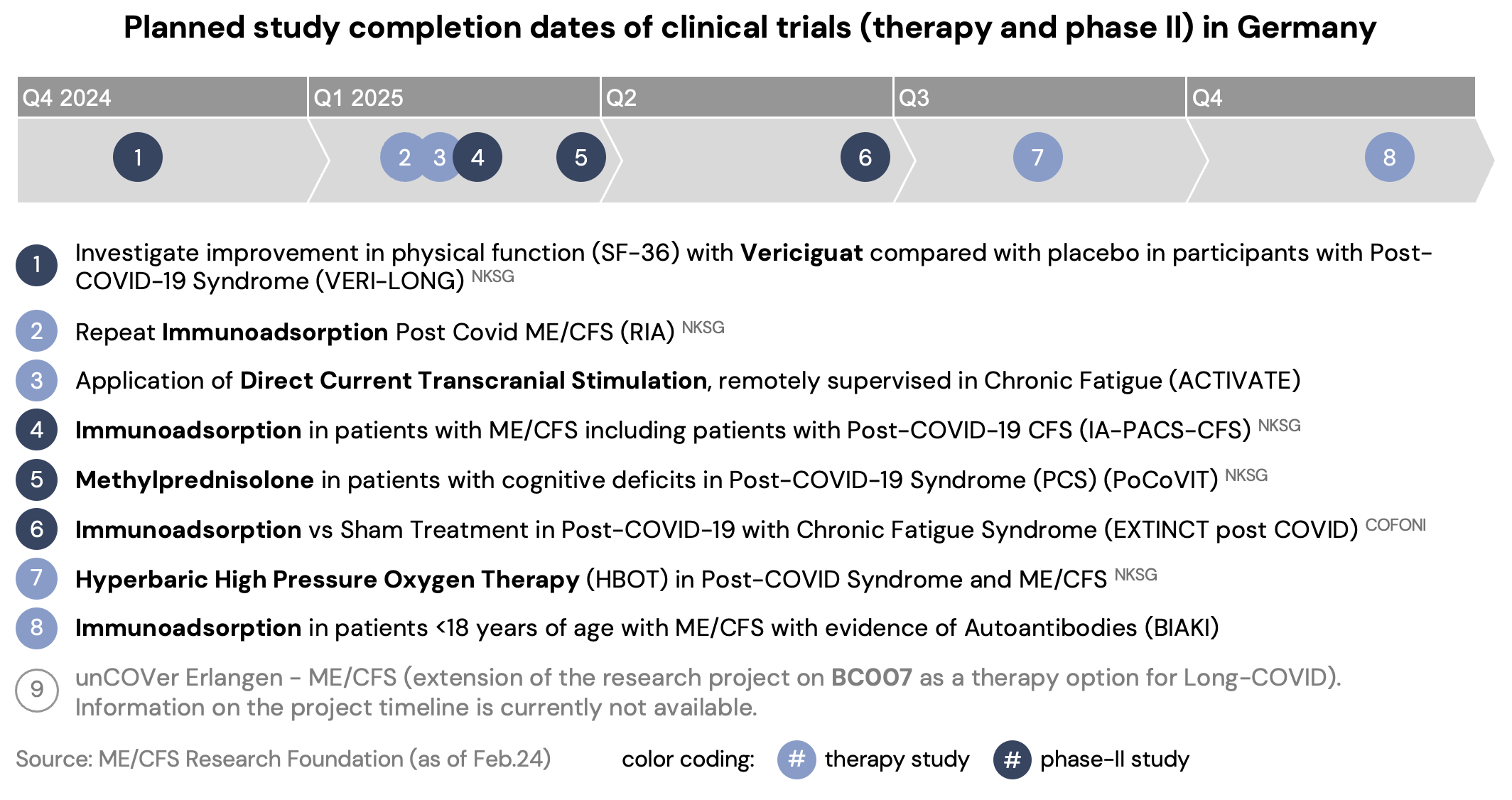
Towards the end of 2024, results are expected from the phase II study on Vericiguat (1: VERI-LONG). At the beginning of 2025, results will come through of the therapy studies on repeat Immunoadsorption (2: RIAand on direct current transcranial stimulation (3: ACTIVATE), as well as of the phase II studies on Immunoadsorption (4: IA-PACS-CFS) and on Methylprednisolone (5: PoCoVIT). The results of another phase II study on Immunoadsorption (6: EXTINCT post COVID) are due in mid-2025. The results of the therapy studies on hyperbaric oxygen therapy (7: HBOTand on immunoadsorption in young patients (8: BIAKI) will follow at the end of 2025. No information is available yet on the planned completion date for the therapy study on BC007 (9: unCOVer). Note: planned completion dates serve as an overall orientation. Actual completion dates may differ from these dates for various reasons.
In summary, by the end of 2025, first data on the effectiveness of five potential therapies for ME/CFS will likely be available, including results from three phase II studies (randomized, placebo-controlled). In order to assess how the interventions and drugs tested may potentially benefit ME/CFS patients in the long-term, further controlled clinical trials with larger numbers of test subjects will be required (phase II and III studies). Additional findings can also be expected stemming from the clinical trials carried out under the NKSG , as a result of the data obtained from the research network’s comprehensive diagnostics and biomarker studies in connection with these trials.
Part 5: How many working groups are conducting research on ME/CFS? (veröffentlicht 25.04.2024)
A total of 39working groupsare involved in the ME/CFS research projects, 35 of them in Germany and 4 in Austria. These working groups are spread across a total of 20 different organizations, including universities, university hospitals and research centers. Working groups in medical and scientific research (also referred to as laboratories or “labs”) are groups of people conducting research on specific topics under the direction of experts in their field and that are hosted by at least one organization (e.g. university hospital).

In Germany, 18 of the 35 working groups conducting research on ME/CFS are based at Charité - Universitätsmedizin Berlin and affiliated research institutions. These include the Berlin Institute of Health (BIH) and the Max Delbrück Center (MDC). Other working groups are based at the German Center for Neurodegenerative Diseases (DZNE), the Berlin School of Mind and Brain, Helmholtz Munich and the Max Planck Institute in Erlangen. Remaining groups are based at the university hospitals in Aachen, Erlangen, Freiburg, Lübeck and Munich as well as at the universities in Heidelberg, Munich, Regensburg and Würzburg.
Of a total of four working groups involved in ME/CFS research are found in Austria, out of which two are based at the Medical University of Vienna and one each at the Medical University and the FH Joanneum in Graz.
Allworking groupsconducting research on ME/CFS are listed with descriptions and links to their individual research projects in the ME/CFS Research Register .
Teil 6: How are the ME/CFS research working groups networked with each other?? (published 22.05.2024)
So calledresearch networksplay a crucial role in ME/CFS research in addition to the working groups described above. These research networks are alliances or consortia of several research groups that have been established to conduct cooperative research specifically on ME/CFS (as a complete or partial focus) on the basis of joint funding. So far, three German research networks have been established:

The National Clinical Study Group (NKSG) and the research network Immune Mechanisms of ME (IMMME) were both founded in 2022 and are funded by the Federal Ministry of Education and Research (BMBF). They focus on clinical research (NKSG) and basic research (IMMME) on ME/CFS with a total of 16 ongoing research projects. Funded by the Lower Saxony Ministry of Science and Culture, the COVID-19 Research Network Lower Saxony (COFONI) is currently conducting a clinical trial on ME/CFS (link), but also researches non-ME/CFS-related aspects.
No comparable research networks have yet been established in Austria.
Further research networks could be established in Germany in the near future. This is because the additional BMBF funding of €15 million over 3 years announced in September 2023 (link), several new ME/CFS research projects will emerge, which are to be organized in interdisciplinary networks in accordance with the BMBF funding guidelines. As soon as information on these projects and research networks is available, they will be included in the ME/CFS Research Register. We will report on this in due course.
Part 7: How many scientific publications on ME/CFS have come out of Germany and Austria? (published: 05.06.2024)
The ME/CFS Research Register currently displays 101 publications that have been made available between 2010 and May of 2024 (by researchers and clinicians based in Germany and Austria). There is a clearly visible upward trend in the number of articles and medical guidelines published on ME/CFS.

The number of publications on ME/CFS has increased significantly since 2020, in parallel with the increasing awareness of the disease and the growing medical need arising from post-acute infection syndromes. This trend will continue in 2024 and beyond, given the increasing number of research projects and researchers involved.
Many published articles describe the results of previously conducted research projects and clinical observations. In addition, there are a number of publications that are categorized as secondary research (e.g. articles outlining a hypothesis or summarizing the current state of scientific evidence). These contributions provide valuable insights and important additions to the publication of results from basic, epidemiological or clinical research projects.

Looking at the total of 101 publications by research types (see part 2 for explanation), 15 of these are within basic research. 15 publications belong to clinical research, 36 to epidemiological research and one to both (clinical and epidemiological). 34 publications are the results of secondary research, including medical guidelines, narrative and systematic reviews as well as hypothesis and opinion papers.
All publications in the ME/CFS Research Register are linked to their most important authors, research projects at the core of published results as well as further information. The list of publications in the MRR is updated regularly.
How can you support the work of the ME/CFS Research Foundation?
There is still a long way to go before diagnosis, care and treatment of ME/CFS patients will one day become a medical and social standard. We at the ME/CFS Research Foundation are focussing on biomedical research, which we see as the key element in solving these problems (more on this in our research funding strategy). To do this, we need extensive support from private donors - patients, relatives, families, friends, associations, schools, networks, companies, initiatives, event organisers and all supporters. And if you can't support us directly, maybe you can share our story and motivate others to help. Because only together is such a feat possible.
We fully translate donations and other support into scientifically excellent research, networking and ultimately visible successes, i.e. better ME/CFS diagnostics and therapies. We are happy to work together with other organisations and initiatives - please contact us!
We appreciate all kinds of Support!
Please register for our Newsletter:






